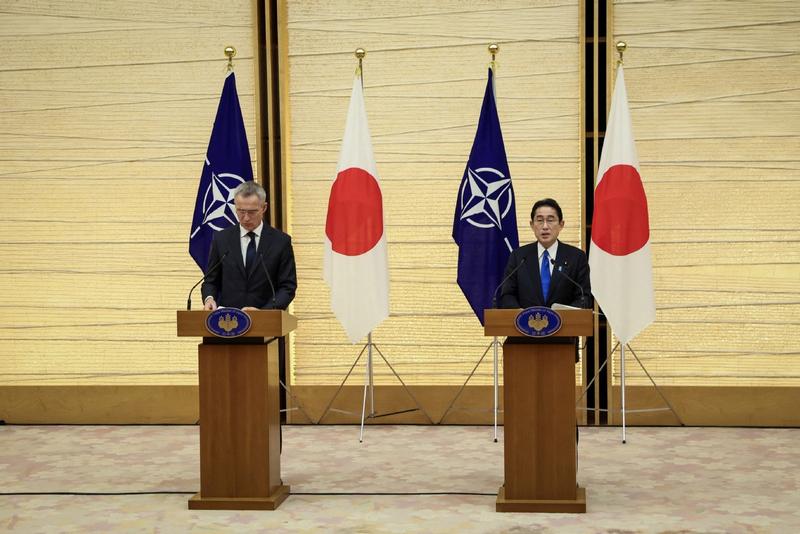Tokyo's move to align itself with US and NATO has a hefty price, experts say
 NATO Secretary-General Jens Stoltenberg and Japan's Prime Minister Fumio Kishida hold a joint media briefing on January 31, 2023 in Tokyo, Japan. (PHOTO / AP)
NATO Secretary-General Jens Stoltenberg and Japan's Prime Minister Fumio Kishida hold a joint media briefing on January 31, 2023 in Tokyo, Japan. (PHOTO / AP)
What Japanese say and what they mean can be two entirely different things, and in this context the Japanese word honne refers to real, inner feelings, and the word tatemae refers to the feelings one expresses publicly.
As confusing as such behavior may be for non-Japanese dealing with Japanese in sundry matters of daily life, imagine the difficulties it poses for diplomats, where properly grasping the slightest nuances can be critical.
"Recent remarks by Japanese leaders about China leave one wondering what their honne is," says Wang Qi, a researcher of East Asian affairs at the Chinese Academy of Social Sciences in Beijing. While Japan constantly reassures China that the two countries are partners rather than adversaries, in Japan's dealings with the United States and NATO it constantly hypes the so-called China threat, Wang says.
Many academics and diplomats have aired views similar to those of Wang, and the Chinese injunction "honor your promises and act prudently" is one that is common currency in such circles when talking about China and Japan. Indeed, it has come up in talks between President Xi Jinping and Japan's Prime Minister Fumio Kishida, when Foreign Minister Qin Gang talked on the phone with his Japanese counterpart Yoshimasa Hayashi and almost every time at Chinese Foreign Ministry daily briefings when talk turns to Japan.
Contrary to China, whose policy toward Japan has been consistent and forthright, the escalation in rhetoric that Japan resorts to talking about China is there for all to see and hear: from "worry" to "serious concern" and "grave concern" to "the biggest strategic challenge".
"Actions speak more loudly than words," Wang says. "Based on the way Japan has acted recently, one can hardly conclude that it is keen to work in a collaborative way with China."
Wang referred to Japan's recent curbs on the export of equipment for manufacturing computer chips to China as well as Tokyo's military collaboration with the US and NATO said to be aimed at "containing" China.
In the 50-minute phone conversation between Qin and Hayashi, the Japanese foreign minister said he believes "Japan and China could hardly achieve development and prosperity in isolation from each other". Yet soon after that telephone call, Japan announced it would be part of so-called tech decoupling from China that the United States has advocated, restricting exports of advanced semiconductor manufacturing equipment from this spring.
The irony in all this, Wang said, is that Japan itself had once been a victim of US protectionism and sanctions, yet now it is failing to choose principles instead of sides to take a strong stand against protectionism.
The Plaza Accord in 1985 resulted in a very strong yen and further hurt Japanese exporters, which ended with Japan falling into the abyss of what is widely called the lost three decades.
Aggressive path
On the military front, Tokyo has chosen an aggressive path, remilitarizing itself and inviting NATO and the US to meddle in East Asia, disregarding a balance of power that has kept the region in peace for more than 70 years.
In talks with US President Joe Biden and NATO Secretary-General Jens Stoltenberg over the past few weeks, Kishida made no attempt to hide his ambition to vie for hegemony in Asia by putting on display an aggressive Japan committed to growing its military and with few qualms about using military might as a tool of statecraft.
Shigeki Nagayama, a law professor at Tokai University in Japan, said the Japanese government's move of welcoming other military blocs' involvement in the Asia-Pacific region is to enhance its own defense capability, and will only heighten the risk of instability in the Asia-Pacific.
"Japan's self-defense forces already conduct joint exercises and training with NATO countries and can integrate command and combat systems if needed," Nagayama said. "It has now become possible for NATO to intervene in East Asian affairs, which is bad for stability in the region and for Europe. It is very disturbing."
Japan's hostility toward China does not come without a hefty price. For one thing, economic ties between Beijing and Tokyo that have flourished in recent years are now showing signs of fraying. China Customs said that South Korea overtook Japan as the country's fourth-largest trading partner last year, with trade valued at $362 billion.
Wang said: "The semiconductor curbs could further hurt Japan's economy because after all it is a strategy of US corporate monopolies using apparent coercive means to maintain technological and economic superiority over its allies and independent states in the Global South.
"Washington does not care about slowing down global technology upgrades and economic development. It only cares about diverting the world away from global cooperation toward the US-favored realm, and in the process Japan's interests are not considered at all."
Another consequence is in the security sphere, because, despite domestic protests, Kishida is offering Tokyo to Washington as the bulwark of its security interests in Asia and the front line in a possible confrontation.
Yoichi Komori, an emeritus professor at the University of Tokyo, said the US and NATO are using Japan as a shield in case of conflict.
"That's what the US and NATO want. It's very dangerous for Japan to give full play to its self-defense forces in East Asia, which is also contrary to Article 9 of Japan's Constitution. We, as the people, must not allow it."


